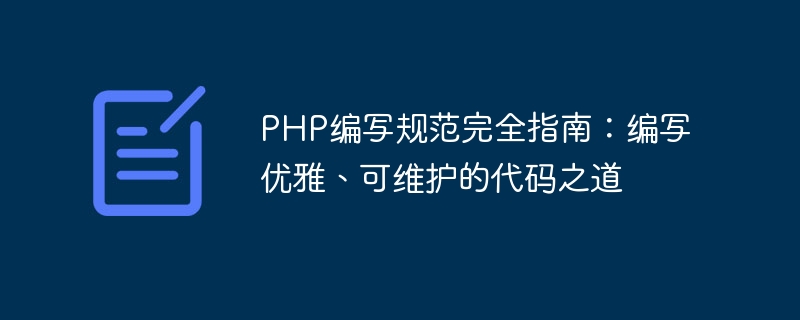Home >Backend Development >PHP Tutorial >The Complete Guide to PHP Writing Standards: How to Write Elegant, Maintainable Code
The Complete Guide to PHP Writing Standards: How to Write Elegant, Maintainable Code
- WBOYWBOYWBOYWBOYWBOYWBOYWBOYWBOYWBOYWBOYWBOYWBOYWBOriginal
- 2023-08-26 23:37:061131browse

The Complete Guide to PHP Writing Standards: How to Write Elegant, Maintainable Code
Introduction:
Use a consistent coding style in modern software development and specifications are very important. Not only does it improve code readability and maintainability, but it also helps with collaboration across the entire team. This article will introduce some basic principles and best practices for PHP writing specifications, and provide some example code as a reference.
1. Naming specifications
- Class names should use camel case naming, for example: MyClass.
- Method and function names should use camelCase naming, for example: myMethod.
- Variable names should use lowercase letters and underscores, for example: my_variable.
- Constant names should be in all capital letters, with underscores separating words, for example: MY_CONSTANT.
Sample code:
class MyClass {
public function myMethod() {
$my_variable = 10;
const MY_CONSTANT = 'constant value';
}
}2. Indentation and spaces
- Use four spaces for indentation instead of tabs.
- The maximum length of each line of code is recommended to be 80 characters, exceeding line breaks.
- A space should be added after the comma.
Sample code:
if ($condition1 && $condition2
&& $condition3 && $condition4) {
// do something
}
$my_array = array('apple', 'banana',
'orange', 'pear');3. Curly braces and blank lines
- The left curly brace should be written at the end of the same line, and the right brace should be on a separate line .
- There should be a blank line between the function and the class.
Sample code:
if ($condition) {
// do something
} else {
// do something else
}
class MyClass {
public function myMethod() {
// do something
}
}4. Comments
- Use comments to explain the function and logic of the code.
- Comments should be concise and clear, and should not be over-commented.
Sample code:
// 计算两个数的和
function sum($a, $b) {
return $a + $b;
}5. Error handling
- Use the exception handling mechanism to handle and capture errors.
- Do not use the error suppressor (@) to hide errors.
Sample code:
try {
// some code
} catch (Exception $e) {
// handle exception
}6. Database operation
- Use PDO or ORM to perform database operations.
- Use parameter binding to prevent SQL injection attacks.
Sample code:
$stmt = $pdo->prepare("SELECT * FROM users WHERE username = :username");
$stmt->bindValue(':username', $username);
$stmt->execute();
$result = $stmt->fetchAll(PDO::FETCH_ASSOC);7. Code reuse
- Try to avoid repeated code.
- Use functions and classes to encapsulate reusable code snippets.
Sample code:
function sayHello($name) {
echo "Hello, " . $name;
}
sayHello('John');Conclusion:
Following PHP writing specifications can help improve the quality and maintainability of code and improve development efficiency. Through unified coding styles and naming conventions, team members can more easily read and understand the code, reducing potential bugs and errors. I hope that some of the suggestions provided in this article will be helpful to readers when writing PHP code.
The above is the detailed content of The Complete Guide to PHP Writing Standards: How to Write Elegant, Maintainable Code. For more information, please follow other related articles on the PHP Chinese website!
Related articles
See more- How to elegantly encapsulate third-party components in Vue? Introduction to packaging methods
- Manageable and maintainable automated testing using PHP WebDriver
- The combination of Vue.js and TypeScript language to build maintainable enterprise-level front-end projects
- PHP learning experience: how to write maintainable code
- Laravel Best Practices: Building Maintainable and Scalable Applications

